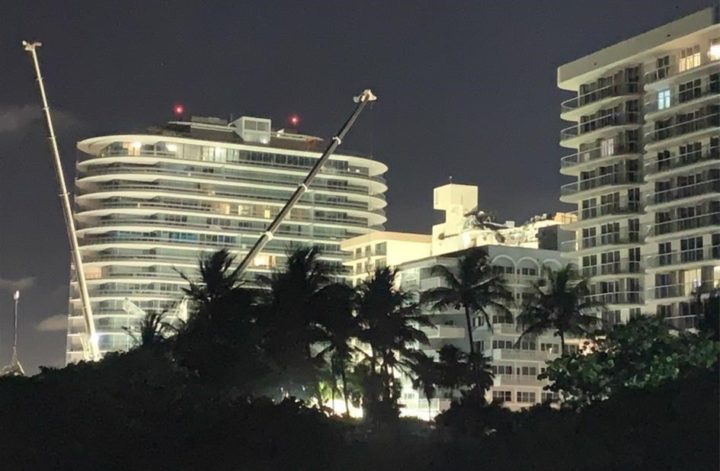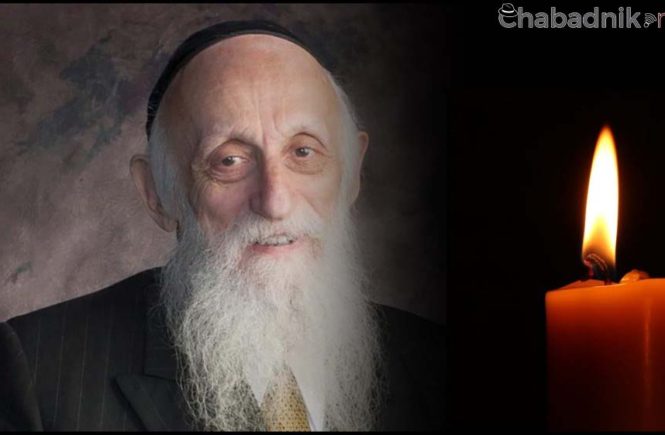The Shul of Bal Harbour’s overwhelming effort continues providing comfort and aid to all
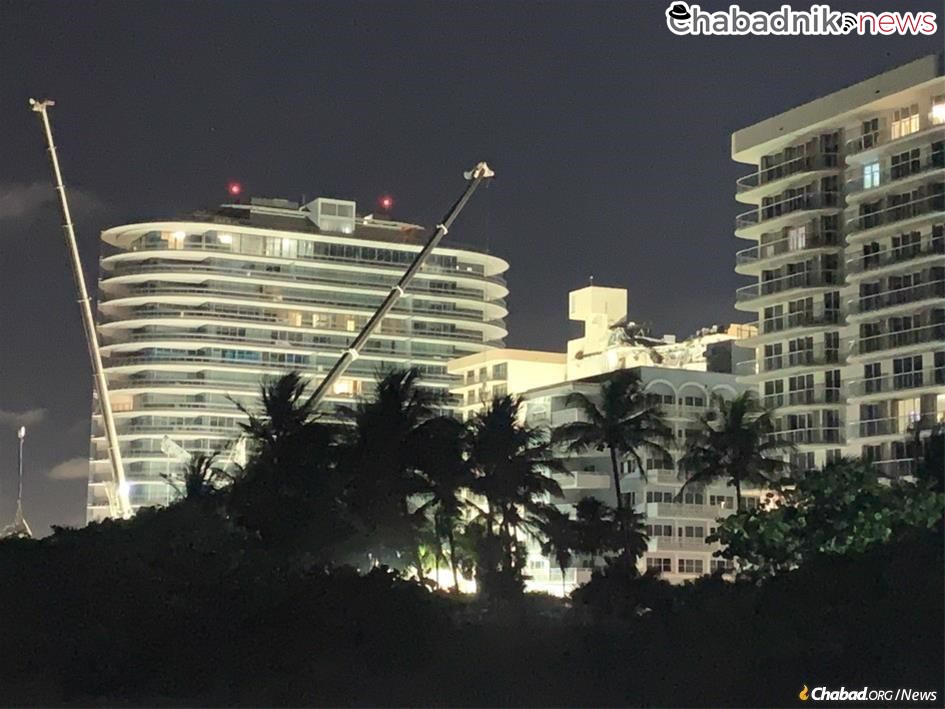
SURFSIDE, Florida — The feeling here can only be described as eerie. A heavy police presence patrols every artery leading into the twin beachside towns of Surfside and Bal Harbour, leaving its chic, normally bustling streets oddly empty. Nowadays, the most common sights and sounds are flashing lights and sirens, as various local, county, state and federal vehicles rush to and from the sealed-off site where Champlain Towers South once stood. What was a week ago a 135-foot building is now compressed into 35 feet, and most refer to it simply as “the pile.”
The digging at what remains of the building has gone on unabated for six days, with expanding resources brought in from throughout the state and volunteers, including from Israel and Mexico, joining Miami Dade frontline workers each day. At night, bright lights illuminate the site, the massive cranes brought in to move heavy slabs extending upwards, as if pointing to the sky. On the beach where makeshift barriers mark the perimeter of the exclusion zone, the peaceful murmur of waves lapping the shore is broken by the sharp buzz of cutting metal and the thud of distant hammering.
The work never stops, and the days are punctuated only by evening briefings during which authorities announce whether anyone has been recovered at the site. With each passing hour, hope that anybody will be found alive diminishes, though the prospect of a miracle never goes away. What started as a frantic emergency and relief effort in the immediate aftermath of the tower’s early morning collapse has morphed into everyday life in Surfside
Much the same has taken place at The Shul of Bal Harbour, the Chabad-Lubavitch center that sits at the heart of the Jewish community stretching from Surfside through Bal Harbour, Bay Harbor and Indian Creek. If, in the first hours and days after the tragedy, the community rushed forward to fill the center’s massive, soon-to-be-completed expansion with fresh food, non-perishables, water, clothes, tablets, hygiene products, phone chargers and anything else their displaced friends and neighbors and families of the missing needed, now the Jewish community aid effort has become part and parcel of The Shul’s regular work. None of which cancels its actual regularly-scheduled activities: on Monday, 350 campers arrived at The Shul for the first day of their Gan Israel day camp, and before then, volunteers had to sort through all the donated items and move them to another location. The young campers include grandchildren and other relatives of individuals who lived at Champlain Towers South.
Directing The Shul’s community relief work are Rabbi Zalman and Chana Lipskar, son and daughter-in-law of the center’s founders, Rabbi Sholom and Chani Lipskar. For Rabbi Zalman Lipskar the day starts early. He teaches a Torah class at 6:30 a.m., but by 8 is working in his office. One morning he begins by coordinating aid to families who have lost everything in what remains of Champlain Towers South, asking his office to start calling a list of names to get an account of what their immediate needs are. “I want someone to reach out to them, so they don’t have to call us,” he explains to the woman making the calls. “We don’t want them to feel like someone is doing them a favor. We want them to know they’re family.”
In the immediate aftermath of the collapse, The Shul started a campaign to raise much-needed funds for affected families, and to date, nearly $1.3 million has come in from 11,000 donors. This aid will be disbursed per family for long-term needs by a confidential committee. This does not include the separate discretionary fund The Shul has been utilizing for miscellaneous needs that have arisen. It was from the discretionary fund that Lipskar purchased ten brand new pairs of tefillin, which were delivered to the center within an hour. Fifteen minutes later, a pair was already on its way to a former resident of Champlain Towers South. When a woman from the community who lived in Champlain Towers needed modest clothing to replace everything she had, the fund was used to pay for a new wardrobe at a Jewish clothing store in Miami, which opened specially for her late at night.

It is not a desk job, though. On Monday, Lipskar attended the first Jewish funeral in Florida connected to the tragedy, an elderly couple who had been recovered from the building’s wreckage. Though all federal, state and local officials have been working their utmost to respect Jewish law during each step of the difficult recovery process, complications that threatened the timeliness of the funeral arose, and with help from officials—including U.S. Sen. Rick Scott—Miami Dade Police chaplains, working together with South Florida’s Chevra Kadisha burial society, carefully worked them out. The bodies were ultimately released and the funeral was able to take place on time when the cemetery agreed to remain open past closing time out of respect for the victims and their families.
Throughout the day, Lipskar receives a flood of media requests from outlets big and small, most of which he simply cannot take. While the area’s Jewish community’s incredible outpouring of love and tangible support for their friends and neighbors, Jewish and not, is a powerful story, there is much to do and the day is short.
After working at his desk for four hours straight Lipskar looks at the clock. In 45 minutes he is meeting with an extended family that has flown into Miami, awaiting any word of their loved one who was in Champlain Towers when it went down.
“I’ve met with these families, and each one is different, their story is unique,” he says. “What connects them all is their palpable connection to G‑d. For me to see their raw faith in G‑d, it’s powerful.”
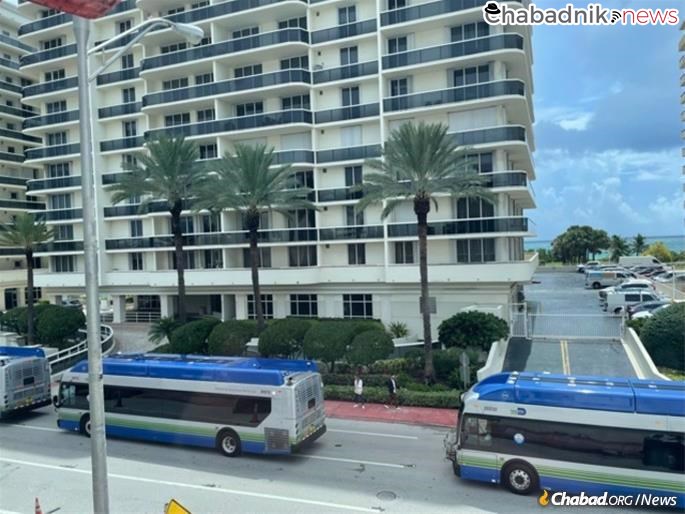
Kosher Food—For Everyone
Due to the necessarily makeshift nature of how emergency efforts began, the main centers of activity for the displaced and family members have moved multiple times. Midweek the family briefing area was moved to the Seaview Hotel, where governmental and nonprofit resources such as FEMA, the Red Cross, Jewish Family Services and the Jewish Federation have set up stations. Likewise, The Shul’s food station—in this Jewish town, all the prepared hot food being served to everyone from emergency frontline workers to families to volunteers is Glatt Kosher—has moved several times since that first Thursday. On Tuesday morning it relocated to the event space of the SoliMar condos across the street from The Shul. Not long after it was finished being set up, three buses with families arrived from the briefing station down the block with police escort.
It is Chana Lipskar and her team of volunteers who have led The Shul’s comfort effort, now at the SoliMar. Coffee and tea, cold and hot cereal, scrambled eggs and empanadas are amongst the breakfast offerings. More than just a dining room, it is a quiet and private space where families come to spend time with each other, and have rabbis and volunteers from the community just be there for them.

At the same time, The Shul has coordinated for local kosher restaurants to deliver three meals a day to displaced families, each family able to call the restaurants of their choosing and order what their family needs and likes.
“I have to tell you, every kosher restaurant in this area deserves a hand,” says Chana Lipskar. “They all jumped at the opportunity to get involved and help in this very real way.”
A little past 1 o’clock Tuesday afternoon Florida Governor Ron DeSantis stops in at the SoliMar. It is a working visit, not a photo-op, and the governor listens carefully as Lipskar and the volunteers describe some of the logistical issues they’ve encountered and hope they can resolve for the sake of all the families involved.
“Every single person here besides myself is a volunteer,” she tells DeSantis towards the end of their conversation. “To see that, I am so humbled, and in that merit we should have—we will have—a miracle. Every person here is doing this for the families.”
Looking around at the room abuzz with people, DeSantis comments on The Shul’s work over the last week. “It’s just phenomenal.”

The Unknowable
Until last week devastation and tragedy on such a scale were unheard of on this glittering stretch of Miami coast. The peace, security and sheer beauty of the Surfside area was part of what made living here so attractive to so many, including the diverse and growing Jewish community that calls the 33154 area code home.
Then came the unthinkable.
“My phone rang at 2:30 a.m. on Thursday morning, that’s when I heard,” says The Shul’s spiritual leader Rabbi Sholom Lipskar. When he and his wife, Chani, established the Jewish community in Surfside in 1981 at the direction of the Rebbe, Rabbi Menachem M. Schneerson, of righteous memory, he knew there’d be difficult days—and there were many in their first years—but little could have prepared him for this. Arriving at Champlain Towers South on Thursday morning, he found a place of rubble, smoke and overwhelming dust. It was a scene that defied words.
“We do not have it within our capacity to understand such a tragedy,” he says. “The human mind does not have the dimensional sensations to be able to absorb something of this nature intellectually. The only thing that has any semblance of ability to communicate during this period of time is G‑dliness, is the neshama, the soul.”
This is what drove the Jewish community to flock to donate and volunteer, sort items and make deliveries, says the senior Rabbi Lipskar. It was a G‑dly way of communicating what they felt, a desire to elevate their surroundings and do something to light a candle in the darkness. And the displaced and the families of the deceased and missing have responded in kind.
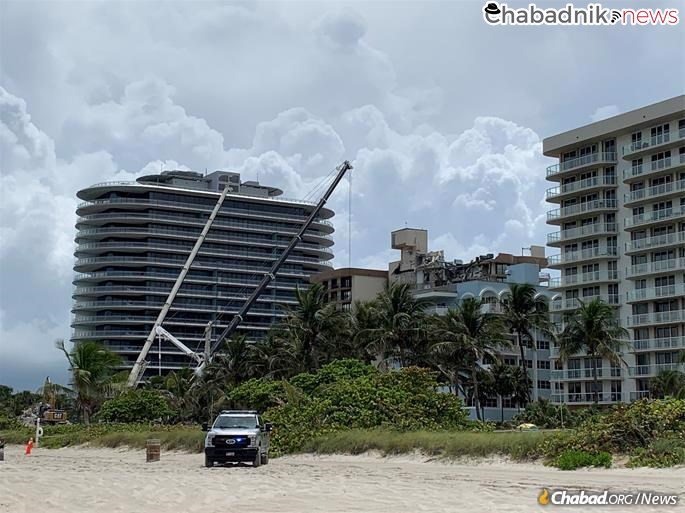
“What is being done is amazing,” agrees one father who lived with his family in a still-standing portion of Champlain Towers South. His loss, he says, is minimal compared to those who lost loved ones. Nonetheless, he and his family have been left with absolutely none of their physical possessions. “This is exactly what we needed right now.”
Back at the collapsed pile that what was once home to so many of Surfside’s own, the work goes on. Miami Dade fire and police, various agencies and volunteers continue operating under difficult conditions—sweltering, humid heat one moment, pouring rain and lightning another—joined by teams from Zaka and Chesed Shel Emes on hand to handle remains when needed.
The pile is a place of tremendous pain and faint hope, but it is much more than that. Amid the hum of machines, jackhammers and the workers wordlessly digging “there is a silence that is deafening,” says the senior Rabbi Lipskar. “You feel, perhaps, a G‑dly presence.” Despite the overwhelming devastation there is a palpable awareness that, no matter what the next day brings, the human body is temporal, but the spirit, the soul—eternal.
One evening this week, a handful of people stood at the beach barrier marking the closest they can get to Champlain Towers South. Among those whispering Psalms from their phones was a mother with her teenage son. “Maybe there is someone still alive there,” she says. Moved to do something, she came to spend a few moments within eyeshot of what has become a sacred place. “I don’t know what will happen, but I know words of prayer will not be in vain.”

